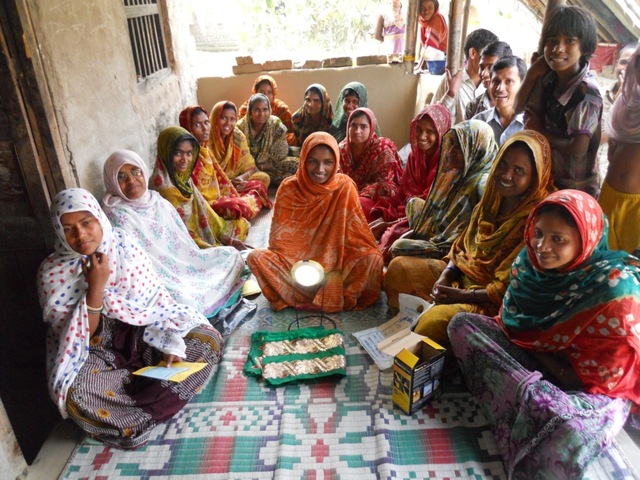Rahima Molla, a zari embroidery worker for the past 5 years, leads a group of Milaap borrowers of solar lanterns in rural West Bengal; all of whom being village women. Her husband works in a tailoring factory. They have a baby 1-year-old son and a 5-year-old daughter who studies at primary school.
Prior to using a solar lamp they had power issues in their own home at night. Unlike most Milaap borrowers in West Bengal, they are not connected to the electric grid at all, rendering their home at night in almost absolute darkness. Their only source of lighting was a kerosene lamp. But for Rahima, their kerosene lamp caused risks, including the prospect of getting burnt or their house being lit on fire by a potential spill of the lamps burning kerosene oil fuel. What particularly worried her was when her young children would get their hands burnt by the kerosene lamp, whenever they touched it out of curiosity. Over that, its lighting was often too dim for her to pursue her zari work at night, or even cooking for her family. [caption id="attachment_2942" align="aligncenter" width="700"] A member from Rahima's group, smiling away to glory![/caption]
A member from Rahima's group, smiling away to glory![/caption]But by borrowing a loan from Milaap to acquire a solar lamp, Rahima’s life and those of her family’s lives have been profoundly impacted. Thanks to her new solar lamp, Rahima is able to carry out her zari work at night under bright light, without the hindrances caused by kerosene lamps. The productivity of her work has increased dramatically. Consequently, her average monthly income has increased by Rs.200, from Rs.800 to Rs.1000.
Furthermore, her husband uses her solar lamp as a torch at night, especially when he needs to go to main bathroom of their village.
NOTE: During the interview with Milaap, all members of this borrower group, including Rohima Mulla, were complaining to the DCBS loan officer in attendance (our local field partner) that the solar cell batteries of their solar lamps were not being charged properly. A local DCBS representative stated that they are trying to replace the malfunctioning solar lamps with newer ones.

Rahima (centre) presenting her juri pieces besides her lamp, along with other members of the group.








